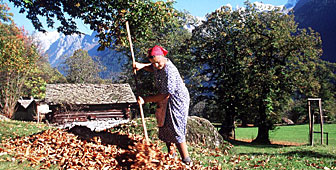Exodus threatens mountain communities

More than 9,000 jobs a year are being lost in Switzerland's mountain regions, prompting an exodus from the villages and valleys.
The Swiss centre for mountain regions says more than half of the areas it represents saw their populations fall between 1995 and 2000. Over the same period, some 46,000 jobs were lost.
“We are now at a turning point,” the centre’s director, Thomas Egger, told swissinfo. “We had quite a good situation up to the middle of the 1990s but since then we have had this depopulation.
“It frightens me. If we don’t take active measures now, the future does not look good.”
Bucking the trend
Until 1995, the population in mountain areas was growing faster than the national average but since then it has only increased by 0.2 per cent against a national figure of 0.4 per cent.
In 28 of Switzerland’s 54 mountain regions, the number of inhabitants has declined since the mid-90s. The worst hit areas include valleys in cantons Graubünden, Valais and Bern.
Egger said the situation in Switzerland was not as bad as in many other European countries but that it was steadily getting worse.
“In France and Italy, the depopulation is much further advanced than here,” he said. “There are already villages which are empty. This is what we don’t want to see here but the process has now started.
“Our main target is to see that mountain policy is an element of every federal policy in Switzerland.”
Local initiatives
Switzerland’s mountain regions encompass a wide variety of terrain from Alpine environments to the more industrialised areas of the Jura. Even within the Alpine regions there is considerable diversity in the local economy.
Jobs lost in recent years include 13,000 in the agricultural sector and 22,000 in state enterprises.
Egger said the solution to tackling the problem lay in initiatives which take local variations into accounts.
“Every region has its own [identity] so a region which is mainly geared to tourism must develop tourism projects,” he said, adding that preferential tax rates for holiday accommodation would be a step in the right direction as well as increased cooperation between tourism and agriculture.
“In other regions which are more industrialised, there will be initiatives like new technological centres. It really depends on the potential of each region.”
swissinfo

In compliance with the JTI standards
More: SWI swissinfo.ch certified by the Journalism Trust Initiative
You can find an overview of ongoing debates with our journalists here. Please join us!
If you want to start a conversation about a topic raised in this article or want to report factual errors, email us at english@swissinfo.ch.